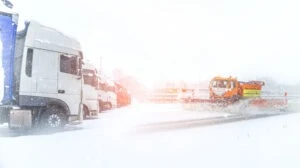
There are many ways that winter weather can cause truck accidents. Driving in rain, sleet, or snow can significantly reduce the traction between the road and your tires, leading to skidding, slippage, and higher chances of an accident.
Colder weather can also accelerate road damage. Potholes, cracks in the road, uneven lanes, slippery surfaces, and cracked or damaged tires can all cause or contribute to an accident.
Oftentimes, winter weather requires slower, more cautious types of driving. If a driver does not adjust to the weather patterns, they could lose control of their vehicle and cause a car accident. Collisions with trucks, especially in winter weather conditions, can cause severe injuries and property damage. A truck accident lawyer can help you demonstrate that negligence caused your bad weather collision.
Winter Weather and Trucking Accidents
According to the National Highway Traffic Safety Administration (NHTSA), 17% of all motor vehicle accidents happen in winter conditions. Depending on where you live, you may experience winter weather for different amounts of time per year. Truck drivers tend to crisscross the nation while delivering freight, supplies, and materials, so they may face some amount of winter driving irrespective of where they operate from.
Winter weather can cause truck accidents in many different ways, mostly by making it more dangerous to operate a truck on the road in colder, darker, and slipperier conditions. Consider the following:
- Rain, sleet, and snow can reduce the traction between your tires and the road, leading to slippage, skidding, and swaying as you drive.
- A lack of maintenance can lead to a serious accident, especially if a tire blowout caused by cold weather is a direct or proximate cause of a malfunction.
- Tire maintenance can become more of a liability on slick winter roads. Maintenance errors or a lack of preparedness can lead to many types of accidents, from jackknifing or a loss of control of your vehicle to a rollover or a rear-end accident.
- Inexperience in terms of safe driving rules for winter can cause truck accidents. For example, drivers must understand how to increase following distance or how to control a skid on ice if they are driving in these conditions.
- Winter driving requires preparedness for driving with less sunlight. Drivers must also be ready to cope with drowsiness, poor visibility, and physical changes as the body adjusts to colder temperatures.
- Safe driving on slick roads usually requires a reduction in speed. This condition can increase a driver’s driving time between stops, making it harder to cope without breaks and to stay focused for longer periods of time.
- Winter weather and snow storms can affect everything from your batteries and lights to your wipers, your mirrors, and your floor mats. A slip of the foot, a blind spot issue, or an engine failure as you drive can have catastrophic consequences.
Understand and Prepare for the Dangers of Winter Driving
A good way to avoid a winter truck accident is to understand how winter weather can cause a crash and to prepare yourself for dangerous road conditions you may face. The NHTSA recommends the following for safe winter driving:
- Have your vehicle adequately serviced
- Change your tires to snow tires as needed
- Make sure to check your tire pressure and the condition of your tires regularly and before long trips.
- Check your knowledge regarding safe driving rules for winter, such as safe driving speeds, how to handle dangerous conditions such as fog, and what to do if you lose control of your vehicle.
Options for Victims of Truck Accidents
According to the Federal Motor Carrier Safety Administration (FMCSA), accidents involving large trucks led to about 77,000 injuries in 2020.
If you were injured in a truck accident caused by another party’s negligence, you may be able to file a personal injury lawsuit against them.
Depending on the circumstances of your accident and your injuries, the potentially recoverable damages in a truck accident case may include:
- Costs of post-accident emergency treatment
- Costs of all current and future medical care
- Property damage
- Lost wages for the time the accident caused you to miss work
- Pain and suffering
Liability for Bad Weather Trucking Accidents
Sometimes winter weather can make accidents unavoidable; however, knowing how to drive in poor conditions goes a long way to preventing a collision. Conversely, driving poorly can dramatically increase the chances of an accident. Our team can use the evidence we gather to demonstrate that the at-fault party acted negligently for the weather to cause your collision.
Here is an example of how we may use evidence to meet the four criteria for negligence:
- The at-fault driver owed you a duty of care to drive below the posted speed limit during a storm to keep everyone safe on the road.
- Black box data and the police report indicate the at-fault driver neglected their duty of care by driving at or above the posted speed limit.
- The choice of the at-fault driver to ignore safety precautions caused a collision with you.
- You suffered injuries and other losses as a result of this accident.
Call the Fitch Law Firm LLC for Help with Your Bad Weather Accident Case
If you were involved in a truck accident, the Fitch Law Firm LLC may be able to help you. We represent truck accident victims in Columbus and in various other cities across Ohio.
The Fitch Law Firm LLC may be able to handle all aspects of your insurance claim or lawsuit when we represent you, including all communications, paperwork, and deadlines.
For a free consultation on your case with a member of our team, call the Fitch Law Firm LLC today. We offer representation to our clients on a contingency-fee basis with no up-front payments required.
